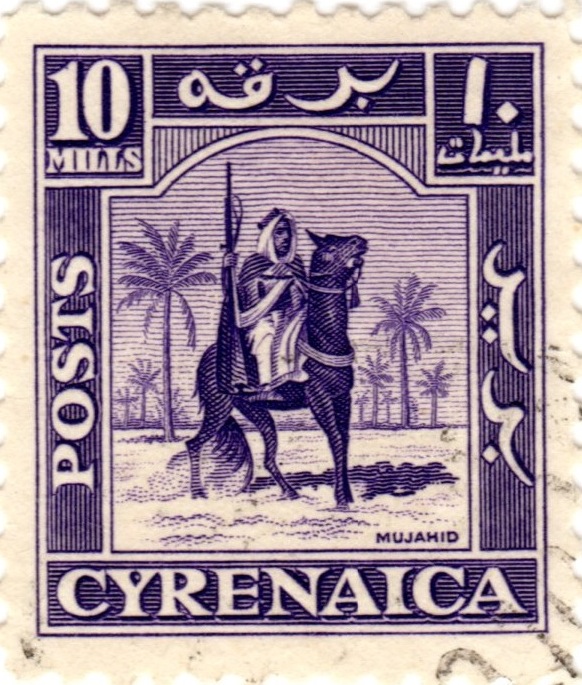
Federalists announced a government for Cyrenaica today. Consisting of a prime minister, deputy prime minister and 24 other ministers, it is viewed as largely the creation of Ibrahim Jadhran, the former Petroleum Facilities Guard commander who is leading the eastern oil terminals blockade and who was elected as head of the self-proclaimed Cyrenaica Council’s Political Bureau on 17 August.
It was Jadhran who named Abdraba Abdulhameed Al-Barasi to be Cyrenaica’s “prime minister” three weeks ago and who today said that the announcement of the government was two days late but that “we fulfilled our promise of a new regional government”.
Barasi said that the reason for the move was because the central authorities “have failed and have shown incompetence and corruption”. They were not to be trusted anymore, he said. Also, Cyrenaica had suffered systematic negligence. His “government”, he declared, took its legitimacy and legal status from the 1951 Kingdom of Libya constitution (which, in fact was amended in 1963, and the three-state federal makeup was replaced by a United Kingdom of Libya with 10 regions).
Insisting that it was “not a secession movement but a movement for Libya”, and that “Cyrenaica is the start and the aim is Libya”, Barasi added, the primary task at the moment was the security situation in Cyrenaica. He promised “swift action” to enact it. All the assassinations there would be investigated. Without law and order being imposed, he added, the whole idea of a Cyrenaica government would be “meaningless”.
As well as ensuring security, it would address the lack of investment in the region as “a matter of urgency”.
According to the Cyrenaica Council (CC), the “government” had been formed “after extensive consultations” with all civil society in the region. It would be based in Beida and would start work next week.
It had been divided into “four clear administrative province” – Ajdabiya, Benghazi, Green Mountain and Tobruk. Each province would have a ten-member management team to run its affairs initially, and would be further subdivided into municipalities.
Although there are no women in his team, there is a fair representation of Cyrenaican tribes which, unlike those in the west of the country, still have some political clout.
Responding to the announcement, Congress Spokesman Omar Hemidan told the Libya Herald that the announcement of the “so-called Cyrenaica Region” was illegal. Those behind it were exploiting the fact that there hd been failings in the government’s performance.
It was not going to work, he suggested, because it was not going to be recognised by any of the state authorities that have been elected by the Libyan people.
“We said our position before about so-called Cyrenaica and repeat once again that despite the shortcomings in [government] performance, it doesn’t mean we divide Libya” Hemidan stated.
The Cyrenaican ministers, said to have been chosen for their qualifications and experience, are:
- Faraj Omar Al-Abdli (Deputy of the Executive Office);
- Colonel Adam Ali Urufi (Interior);
- Abdulhammed Saleh Al-Hayash (Islamic Affairs);
- Abdulmalek Zway (Wealth and Minerals);
- Riad Anwar Shenib (Economy and Commerce);
- Alameen Attaya Al-Minifi (Industry);
- Jibril Razqallah Al-Awami (Planning);
- Mohamed Al-Mabrouk Buqaiqis (High education and Search);
- Mohamed Yousef Fanoush (Education);
- Fatthallah Mohamed Taher Al-Drisi (Public Service);
- Faraj Abdel Salam Al-safty Al-Shalawi (Transportation);
- Abdulhafeed Burghaia Ubaidi (Agriculture);
- Fathi Salem Raheel Ashaba ( livestock and marine);
- Mohamed Saad Hammad Qabaili (Housing);
- Nasser Eddin Mohna (Health);
- Abdel Nasser Suleiman Altbawi (Water and Environment);
- Hamad Saad Saaiti (Tourism and Antiquities);
- Faraj Hamad Al-Musmari (Wounded people)’
- Abdulsalam Ashour Qattani (Culture);
- Mansour Salem Khamis Faitori (Communications);
- Abdulati Mohamed Al-Fakhri (Electricity);
- Tawfiq Uthman Uraibi (Youth and Sport);
- Ibrahim Bakar Imdawi (Justice);
- Hussam Moamen Naas (Social Affairs).
It is unclear what following the “Cyrenaica Government” has, but it is not thought to be great.
Ahmed Elumami
http://www.libyaherald.com/2013/10/24/cyrenaica-government-unveiled/#ixzz2ijft4l77

